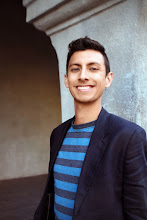2000-2010: A Growing Distinction
I've been thinking about the first decade of the American 21st century. If you were to characterize it, what would you say were its most salient features? As we progress into a century to which we shall never see the conclusion, one can only wonder how historians will look back and summarize our lives. What is our context? While nobody can completely answer this question, I thought I'd take a shot:
I see a decade of growing separation.
This separation is unlike the socio-economic stratification that characterized the Victorian eras and industrializing England. We will no longer have Eloi and Morlocks coming from the same first-world nations. Poverty exists, we cannot deny that. However, the working underclass of industrialization and the service class of America are very different.
Instead, the American social divergence has more to do with perspectives than anything else. Let me explain. I have been reading a book on gender expression and the liberties afforded to modern Americans as opposed to Americans of the early 20th century. We have so many more ways to express ourselves now than we did then. Forget Foucault; we have freedoms! In fact, these freedoms have caused a huge shift in the fabric of our society. The post-modernist turn has caused us to question everything we know about classifications and absloute Truth. We have begun to ask questions like, "what do you mean by feminine," "what exactly is the difference between man and woman," and "are our traditional values even worth upholding?" An athiest, nonconformist, gender-fluid person of color can stand in front of a white, anglo-saxon housewife and the two can survey each other, akin to viewing through onself the looking-glass darkly. We can ask "who am I" by seeing those who are not like us. We have unrivaled access to people who are fundamentally like, and yet unlike, ourselves.
Where class barriers separated the working class worker from the aristocratic industrialist, we have astoundingly fewer barriers. Let's be honest. Further, now that we see the "other self," many odd things taking shape in that mirror. We have begun to question who we are even more as we gain more looking-glasses. It seems like we're going around in post-modern circles, coming back to the same annoying questions every time. Can we even say what our differences are, even though they are finally standing right in front of us?
This is the divide I see going into the 21st century. One person can be incredibly sexually and socially liberated. This person can live next door to (or at least interact with) the most conservative and repressed person in America. We don't even have our traditional ways of pretending the separation doesn't exist! Those barriers are slowly crumbling. We constantly face these problems head on. How do we create a vision of relationships that works as well for the queer couple as for the conservative WASP couple? Is such a middle ground even possible?
This separation continues into other walks of life, too. It's not just sexuality, but a whole range of ideologies and information. How do we deal with the education divide? What about traditional politics and a post-rationalist world? Money, social power, even the ability to distinguish "junk news" from "real information?" What about access to the internet? We live in an information and opinion society that will define the whole century the way the great wars defined the 20th. Here is where our divide distingiushes us.

